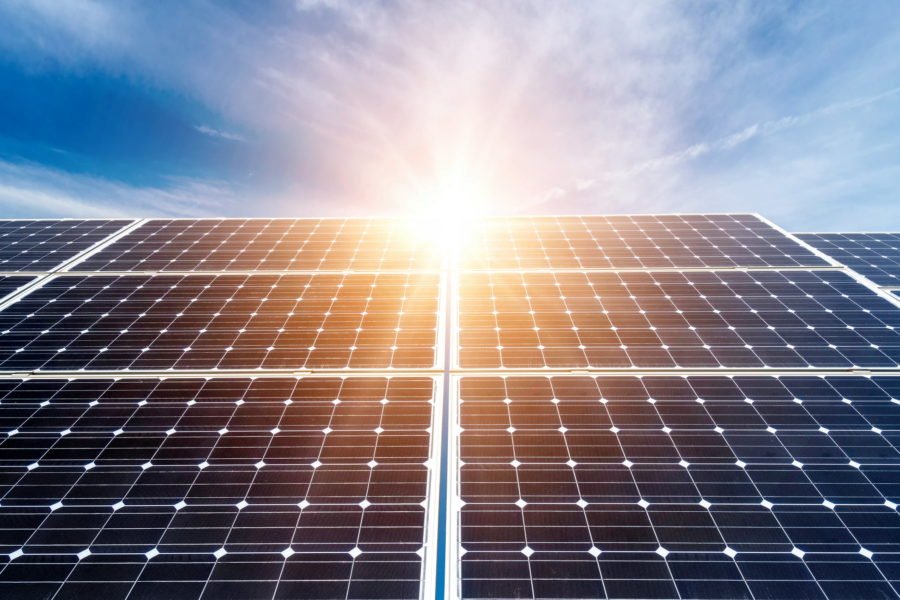The Science of Solar Panels
Solar panels work by allowing photons, or particles of light, to knock electrons free from atoms, generating a flow of electricity. Capturing energy from the sun boils down to the material capable of converting light into electricity. Silicon serves as the semiconducting material most efficient at converting light. Although all solar panels make the same basic makeup, manufacturers have found innovative ways to offer homeowners different options. Let’s take a look at what that means to you!
When deciding on the type of panel you want for your home, a few things should be considered:
- Determine panel efficiency and compare to industry average of 16-18%
- Check panel manufacturer warranties against industry average of 10-25 years
- Look at cost compared to efficiency—efficiency is important, but the most efficient panels aren’t always the best value.
Efficiency & Degradation
Before purchasing solar panels for your home or business, consider how your annual degradation rate and efficiency will affect you. Look at it this way. Every year, home solar panels produce a smaller output of electricity than the year before. It’s a fact of life, solar panels degrade. In year one, you can look forward to 100% efficiency. However, every year after that will bring an estimated 0.8% degradation.
The first year brings an exception. Solar panels always lose between 1-3% of efficiency in the first year. After that, you can look forward to a lower degradation rate of 0.8% per year. For example, after 25 years of solar panel use, you can expect your panels to be about 75-80% efficient. Not bad for two decades of free electricity.
Now let’s look at the types of panels that exist on the market.

Monocrystalline Solar Panels
The high-end option would be your monocrystalline panel. There are some distinct advantages to this variety of solar panels, including its modern appeal. Additionally, monocrystalline panels provide higher efficiency.
It comes down to the more advanced design of the monocrystalline panel. Its single-crystalline construction allows the electrons to bounce around more rapidly. This effect relates to a greater output of energy production. As you would expect, monocrystalline panels are the most expensive options of all. Many individuals prefer this variety of panels because of the dynamic and sleek design it maintains. However, the next option might be more appealing to you also.
Polycrystalline Solar Panels
While not as efficient as their monocrystalline counterpart, polycrystalline panels do provide an advantage in the cost factor. The tremendously favorable cost makes it a widespread option for many people around the nation. You’ll notice a slight difference in the color when looking at polycrystalline compared agents monocrystalline solar panels. Monocrystalline panels maintain a sleek black appeal while polycrystalline panels are a distinct blue.
Because polycrystalline panels are produced at a lower cost than monocrystalline solar panels, they contain a multi-crystalline construction. The higher density crystalline structure slows down the moving of electrons, therefore producing less power output overall. However, the cost advantage is extremely attractive and the power production is considerably worth the investment.
Panel Durability
When looking at panel options, you should also consider panel durability. While most have strong durability, if you live in areas with heavy snow or rainfall you should look at installing panels that can withstand your weather condition.
Which panels work for your area?
Your best resource for finding durable solar panels will be the IEC 61215. The International Electrotechnical Commission designed this stress test and subsequent reliability standard to demonstrate and measure the durability of your panels. For homeowners in Southern California and Texas, this may not be as much of a priority. However, if you do live in an area with inclement weather, be sure to install panels that meet the IEC 61215 standards.
Cost of Panels
The biggest differentiating factor when comparing solar panel costs is efficiency. For homeowners just starting their solar research, it may seem like you need to find and install the most efficient panels. However, you will mostly likely end up over-spending on technology that your home wouldn’t need.
Instead of looking for the best and most efficient panels, work with a trusted solar company like NRG Clean Power to identify your specific needs. Our solar experts can evaluate your home energy usage, solar needs and recommend the right panels for your project. Usually, it comes down to finding panels that meet the standard efficiency ratings and strategically designing your panel installation to optimize productivity.
When considering cost, you should also look at warranties. Your solar system is made to last—don’t install panels with poor warranties. The average warranty is between 10-25 years; however, when designing your system, we wouldn’t recommend choosing any panels that do not offer a 25 year warranty. The reason? There are plenty of options that do! Why invest money on panels with uncompetitive guaranties when you can invest the same amount for something that will be covered for twice as long.
What Does All This Mean?
Now that we talked about the technical aspects of panels, manufacturer warranties and cost, how do you actually choose a panel for your home? There are many brands out there with varying efficiency and output.
You need to look for the overall system that will get you what you need, and that is electricity output. Does the system produce what you need it to produce and is the system reasonably priced? Also, does the system offer competitive warranties to ensure your long-term solar investment?
There are brands many consider high-end or low-end. While we do offer brands from each spectrum, keep in mind that at the end of the day, they all function toward a common goal—to generate electricity. Regardless of the brand you choose, just by going solar you will generate your own electricity, and reduce your utility bills!
NRG Clean Power’s Trusted Solar Panel Brands






Authored by Ryan Douglas
NRG Clean Power's resident writer and solar enthusiast, Ryan Douglas covers all things related to the clean energy industry.


